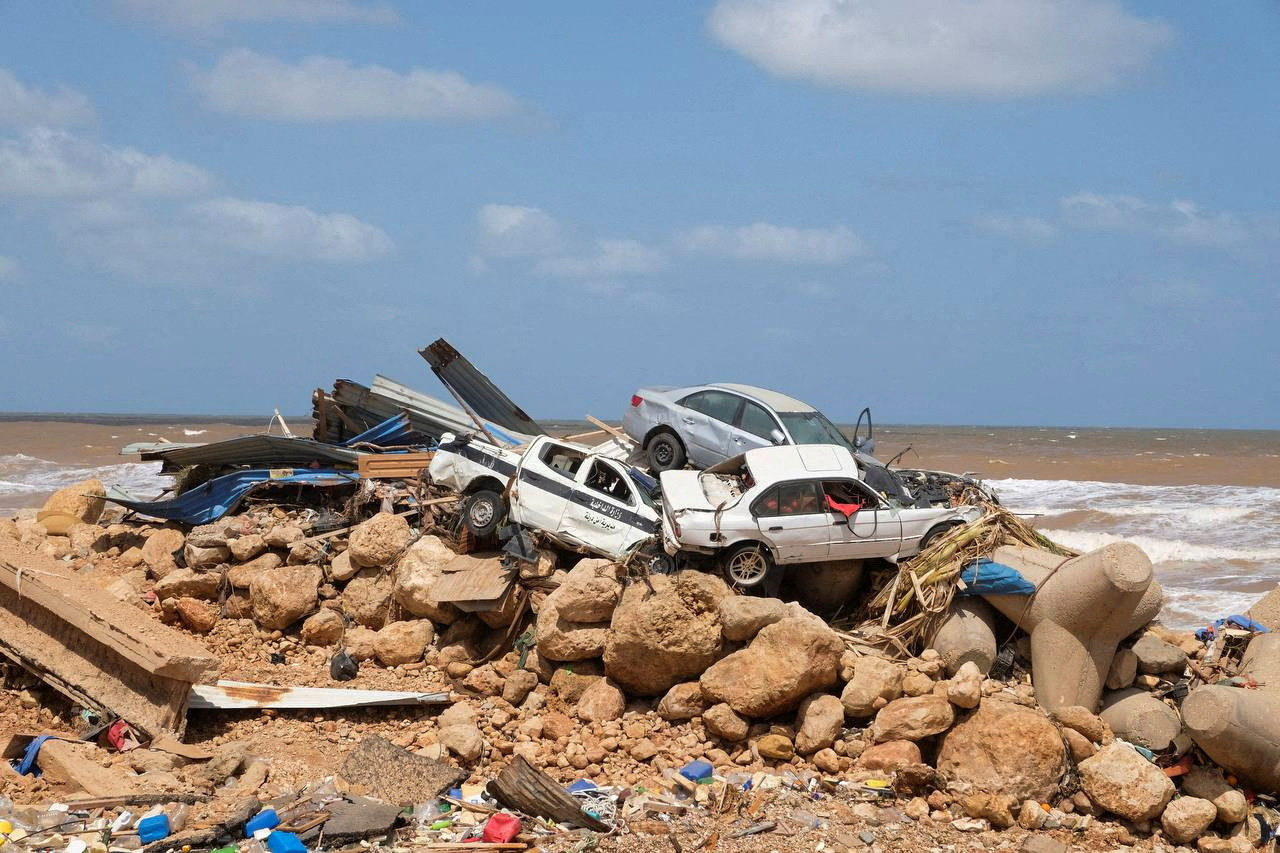In Libya, a devastating Mediterranean storm resulted in a tragic loss of life, with thousands perishing and over 10,000 individuals reported missing. The calamity unfolded as the powerful storm, named Daniel, breached dams, demolished structures, and inundated as much as a quarter of the eastern coastal city of Derna.
According to a senior medical professional in Derna interviewed by Reuters, the death toll exceeded 2,000. Meanwhile, officials in eastern Libya, as reported by local television, estimated the toll to be in excess of 5,000.
Storm Daniel raged across the Mediterranean, striking a country already fractured and in disarray due to more than a decade of conflict.
In Derna, a city with approximately 125,000 residents, Reuters journalists witnessed devastated neighborhoods, with buildings washed away and cars overturned in streets buried in mud and debris caused by the torrent unleashed when dams ruptured.
Mohamad al-Qabisi, the director of Wahda Hospital, revealed that 1,700 individuals lost their lives in one of the city’s districts, while 500 perished in the other. In the hospital corridors, numerous bodies were seen laid out on the ground, as grieving family members attempted to identify their missing loved ones.
Hichem Abu Chkiouat, the minister of civil aviation in the eastern administration, stated via phone after visiting Derna, “Bodies are lying everywhere – in the sea, in the valleys, under the buildings. I am not exaggerating when I say that 25% of the city has disappeared. Many, many buildings have collapsed.”
According to reports from local al-Masar television, the interior minister of the eastern administration claimed that more than 5,000 lives had been lost.
Also Read: Unprecedented Diplomacy: Putin and Kim Jong Un’s Summit in Siberia
Other cities in the eastern region, including Benghazi, Libya’s second-largest city, also suffered the storm’s devastating impact. Tamer Ramadan, leading a delegation from the International Federation of the Red Cross and Red Crescent Societies, anticipated an immense death toll, remarking, “We can confirm from our independent sources of information that the number of missing people is hitting 10,000 so far,” during a video conference with reporters.
The United Nations Office for the Coordination of Humanitarian Affairs stated that emergency response teams had been activated to provide assistance on the ground.
In response to the crisis, Turkey and other nations promptly dispatched aid to Libya, including search and rescue vehicles, rescue boats, generators, and food. Distraught residents of Derna hurried back to their homes in search of their missing loved ones.
‘NEVER FELT AS FRIGHTENED’

In Derna, Mostafa Salem, aged 39, shared the heart-wrenching news that he had lost 30 of his relatives. He told Reuters, “Most people were caught unaware, asleep when it happened.”
Raja Sassi, also 39, managed to survive the flood alongside his wife and young daughter, as they reached an upper floor just in time. Tragically, the rest of his family did not make it. He recounted, “Initially, we mistook it for heavy rain, but around midnight, we heard a deafening explosion, and it was the dam bursting.”
At Tripoli airport in northwest Libya, a woman’s anguished cries echoed as she received a call delivering the devastating news that most of her family members were either dead or missing. Her brother-in-law, Walid Abdulati, emphasized the extent of the tragedy, saying, “We’re not talking about one or two casualties per family but, in some cases, up to 10 family members lost.”
Karim al-Obaidi, a passenger on a flight from Tripoli to the east, shared his overwhelming fear, stating, “I’ve never felt such terror before… I’ve lost all contact with my family, friends, and neighbors.”
An interior ministry spokesperson informed Al Jazeera that naval teams were engaged in the challenging task of searching for “numerous families swept into the sea in the city of Derna.”
FLOOD WARNING
Derna, a city divided by a seasonal river originating from the southern highlands, is typically shielded from flooding by the presence of dams.
A video circulating on social media captured the remains of a collapsed dam located 11.5 kilometers (7 miles) upstream of the city, where two river valleys converge, now surrounded by vast pools of muddy water. In the video, a voice can be heard saying, “There used to be a dam,” and Reuters independently verified the location based on the footage.
In a research paper published last year, hydrologist Abdelwanees A. R. Ashoor, affiliated with Libya’s Omar Al-Mukhtar University, underscored the recurring threat of flooding in the seasonal riverbed, known as a wadi, to Derna. Ashoor documented five flood events since 1942 and stressed the urgent need for consistent dam maintenance. The paper warned, “In the event of a major flood, the consequences for the wadi’s residents and the city would be catastrophic.”
Leaders from around the world, including Pope Francis, expressed profound sadness over the loss of lives and destruction in Libya. U.S. President Joe Biden offered his condolences and announced the dispatch of emergency funds to aid organizations.
Libya remains politically divided between eastern and western factions, and essential public services have deteriorated since the 2011 NATO-backed uprising, which triggered years of factional conflicts.
Although the internationally recognized government in Tripoli lacks control over eastern regions, it has dispatched relief assistance to Derna. A Reuters journalist on board an aid flight departing from the western city of Misrata reported this effort.

